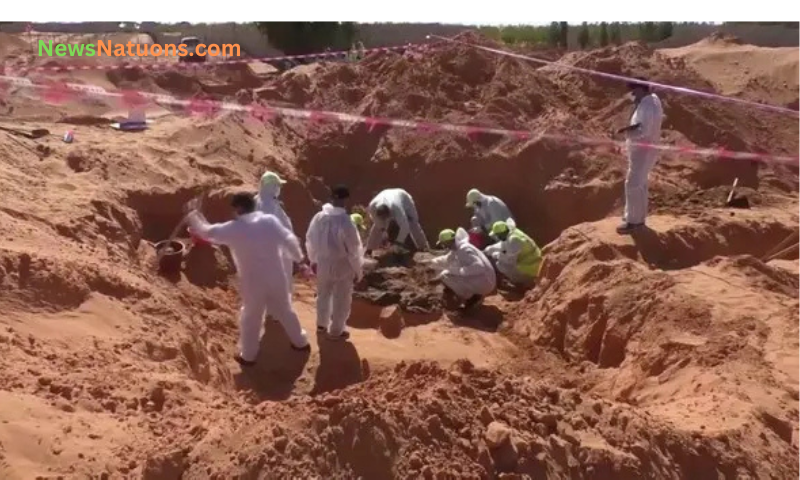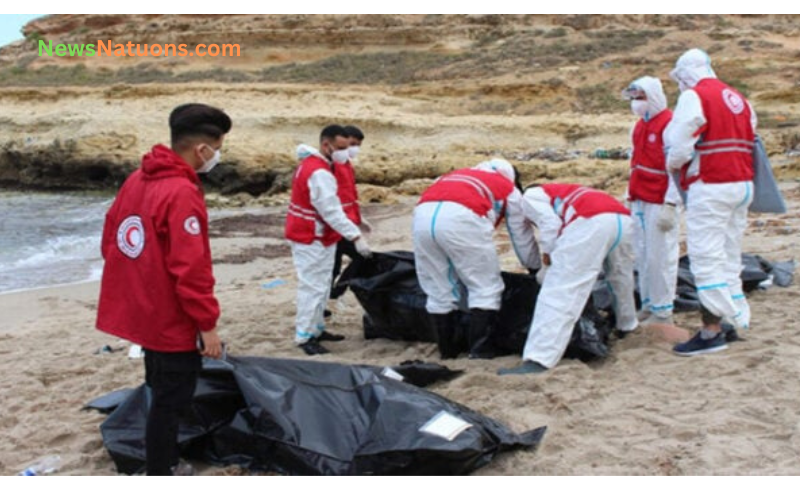In a deeply disturbing development, dozens of bodies have been found in militia-controlled centers in Libya’s capital, Tripoli. The discovery has sent shockwaves throughout the international community and raised serious concerns about human rights violations and potential war crimes in the region. The United Nations Human Rights Office has expressed grave concern over what it calls “possible evidence of extrajudicial killings,” urging immediate action and investigation.
Discovery in Former Militia-Controlled Areas
The bodies were found in areas that were previously under the control of the notorious militia group known as the Stability Support Apparatus (SSA). This group, known for wielding significant influence in parts of Tripoli, especially the Abu Salim district, had a reputation for maintaining brutal control. The SSA’s leader was reportedly killed in armed clashes last month, which led to shifts in territorial control. In the aftermath, new forces and humanitarian workers entering the region uncovered these shocking scenes.
According to the United Nations High Commissioner for Refugees (UNHCR), ten burned bodies were discovered at the former SSA headquarters in Abu Salim. In addition, 67 more bodies were found across Abu Salim and in the Khadra Hospital, many showing signs of torture and execution-style killings. These findings suggest systematic violence and raise critical questions about what occurred during the SSA’s rule.
A Suspected Mass Grave and the Fear in Tripoli
What makes the situation even more alarming is the discovery of a suspected mass grave within Tripoli’s zoo area. Officials have yet to confirm how many bodies lie beneath the surface, but initial assessments indicate the possibility of more mass killings. Such discoveries only add to the horror and scale of violence that might have gone unnoticed or unreported under militia rule.
In response to the emerging evidence and security concerns, authorities in Tripoli have imposed strict curfews. Schools are closed, public gatherings are banned, and citizens have been ordered to remain indoors. The city, once bustling with life, now sits under a tense silence, as residents try to process the grim reality of what has transpired in their neighborhoods.
United Nations and International Response
The United Nations has called on all parties involved in the Libyan conflict to observe an immediate ceasefire. The organization emphasized the urgent need to protect civilians and to allow humanitarian access to affected regions. The Human Rights Office of the UN also called for a transparent, independent investigation into the deaths to ensure that those responsible are held accountable.
Libya has faced a prolonged period of instability since the fall of Muammar Gaddafi’s regime in 2011. The power vacuum has led to the rise of numerous armed groups vying for control of cities and resources, with Tripoli often becoming the battleground. Amid these struggles, civilians have repeatedly suffered from violence, displacement, and loss of basic services. The latest discovery of bodies adds a dark new chapter to this ongoing tragedy.
The Urgent Need for International Oversight
Human rights organizations and local activists have been raising concerns about abuses in militia-controlled areas for years, but little has been done to address these issues due to the fragmented political landscape in Libya. Now, with concrete evidence surfacing in the form of mass deaths, international actors may be compelled to intervene more directly.
Experts stress that this moment could be a turning point if the global community commits to addressing the lawlessness in Libya. Monitoring teams, forensic experts, and human rights investigators must be deployed without delay to document evidence, identify victims, and support grieving families. In the absence of accountability, such atrocities risk being repeated.
The tragedy unfolding in Tripoli is a powerful reminder of the human cost of political instability and unchecked militia power. As the world watches, Libya stands at a crossroads, with an urgent need for peace, justice, and healing.
لیبیا کے دارالحکومت طرابلس سے درجنوں افراد کی لاشیں ملی ہیں، جن کی دریافت نے نہ صرف لیبیا بلکہ پوری دنیا کو لرزا کر رکھ دیا ہے۔ یہ لاشیں ان علاقوں سے ملی ہیں جو کچھ عرصہ قبل تک طاقتور ملیشیا گروپ ’ایس ایس اے‘ کے کنٹرول میں تھیں۔ اقوام متحدہ کے انسانی حقوق کے دفتر نے اس واقعے کو ماورائے عدالت قتل کے ممکنہ شواہد قرار دیتے ہوئے شدید تشویش کا اظہار کیا ہے۔
ملیشیا کے سابق مراکز میں لاشوں کی دریافت
ایس ایس اے، جو کہ طرابلس کے کئی علاقوں خصوصاً ابوسلیم میں مضبوط گرفت رکھتی تھی، گزشتہ ماہ اپنے سربراہ کی ہلاکت کے بعد کمزور ہو گئی۔ اس کے بعد جب سیکیورٹی فورسز اور انسانی حقوق کی تنظیموں نے ان علاقوں میں رسائی حاصل کی، تو انہیں انسانیت سوز مناظر کا سامنا کرنا پڑا۔
یو این ایچ سی آر کے مطابق ابوسلیم میں ایس ایس اے کے سابق مرکز سے دس جلی ہوئی لاشیں برآمد ہوئیں۔ اس کے علاوہ ابوسلیم اور الخضرا اسپتالوں سے مزید 67 لاشیں ملی ہیں۔ ان میں سے کئی لاشوں پر تشدد اور سر میں گولی مارنے کے نشانات پائے گئے ہیں، جو واضح طور پر ماورائے عدالت قتل کی طرف اشارہ کرتے ہیں۔
مشتبہ اجتماعی قبر اور طرابلس میں خوف کی فضا

سب سے تشویشناک بات یہ ہے کہ طرابلس کے چڑیا گھر کے علاقے میں ایک مشتبہ اجتماعی قبر کی نشاندہی بھی ہوئی ہے۔ ابھی اس قبر سے لاشیں نکالنے کا عمل شروع نہیں ہوا، لیکن ابتدائی تحقیقات کے مطابق یہاں مزید افراد کو دفنایا گیا ہے۔ یہ اشارہ کرتا ہے کہ انسانی حقوق کی خلاف ورزیاں صرف چند واقعات تک محدود نہیں بلکہ ایک وسیع پیمانے پر جاری تھیں۔
حالات کی سنگینی کے پیش نظر طرابلس میں کرفیو نافذ کر دیا گیا ہے۔ تمام اسکول بند کر دیے گئے ہیں اور شہریوں کو گھروں تک محدود رہنے کی ہدایت کی گئی ہے۔ شہر جو کبھی رونقوں سے بھرپور ہوتا تھا، اب ایک خوفناک خاموشی کی لپیٹ میں ہے۔
اقوام متحدہ اور عالمی برادری کا ردعمل
اقوام متحدہ نے لیبیا میں جاری تمام مسلح گروہوں سے فوری جنگ بندی کا مطالبہ کیا ہے اور شہریوں کے تحفظ کو اولین ترجیح دینے کی اپیل کی ہے۔ اقوام متحدہ کے انسانی حقوق کے دفتر نے بھی مطالبہ کیا ہے کہ ان ہلاکتوں کی شفاف اور غیر جانبدارانہ تحقیقات کی جائیں تاکہ ذمہ داروں کو قانون کے کٹہرے میں لایا جا سکے۔
لیبیا میں 2011 میں معمر قذافی کے زوال کے بعد سے مسلسل سیاسی عدم استحکام اور خانہ جنگی جاری ہے۔ مختلف مسلح گروہ شہروں اور وسائل پر قبضے کے لیے آپس میں برسرپیکار ہیں۔ اس کشمکش میں عام شہریوں کو شدید مشکلات، نقل مکانی، اور بنیادی سہولیات کی کمی کا سامنا ہے۔ حالیہ انکشافات اس بحران کے ایک اور بھیانک پہلو کو سامنے لاتے ہیں۔
بین الاقوامی نگرانی کی فوری ضرورت
انسانی حقوق کی تنظیمیں اور مقامی کارکنان گزشتہ کئی سالوں سے ملیشیا کے زیر کنٹرول علاقوں میں ہونے والی خلاف ورزیوں کی نشاندہی کرتے آ رہے ہیں، لیکن سیاسی انتشار کے باعث کوئی مؤثر کارروائی نہیں ہو سکی۔ اب جب کہ ان مظالم کے ثبوت سامنے آ چکے ہیں، عالمی برادری پر یہ فرض عائد ہوتا ہے کہ وہ اس صورتحال کو نظر انداز نہ کرے۔
ماہرین کا کہنا ہے کہ یہ ایک اہم موقع ہے کہ لیبیا کے اندرونی معاملات میں عالمی سطح پر توجہ دی جائے اور مؤثر نگرانی اور انصاف کا نظام نافذ کیا جائے۔ فارنزک ماہرین، انسانی حقوق کے نمائندے، اور امدادی تنظیمیں فوری طور پر تعینات کی جانی چاہئیں تاکہ شواہد کو محفوظ کیا جا سکے اور متاثرہ خاندانوں کو انصاف فراہم کیا جا سکے۔
طرابلس میں ابھرنے والی یہ انسانی المیہ صرف لیبیا کا مسئلہ نہیں بلکہ عالمی ضمیر کے لیے ایک امتحان ہے۔ اب وقت آ چکا ہے کہ اس ظلم کے خلاف متحد ہو کر آواز بلند کی جائے، تاکہ انصاف اور انسانیت کی جیت ہو سکے۔











